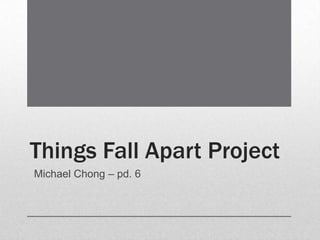
Tfa project (michael chong period 6)
- 1. Things Fall Apart Project Michael Chong – pd. 6
- 2. Examining cultural characteristics of the Ibo people
- 3. The native Ibo people of Umuofia populated what is today the country of Nigeria. They were predominantly located on the Niger River and had a society based on religion and agriculture. Background
- 4. An approximate location of where the Ibo people would have lived.
- 5. The average Ibo family lived in polygamous households. The husband would live in a main complex while his wives and children would live in separate ones, according to whose child is whose. Most marriages were based off agreements set by one family to another for selling them a daughter through the amount of palm wine (a common drink for such occasion) provided by the bride’s family. The groom’s family during these ceremonies would prepare a large and food-heavy feast. Society
- 6. An example of what a common house formation would look like.
- 7. The Ibo people based a majority of their wealth and income through the farming and cultivation of yams. In a town, the top men who have the most amount of yams could receive honorary titles to which the men and their wives would wear, signifying their yam dominance. Agricultural Hierarchy
- 8. Yams!
- 9. The Ibo people believed in a polytheistic religion based on a main creator god, Chukwu, and four other ones. If a person does the correct ceremonies and pleases these gods then they believe that the gods will reward them with positive chi (energy). Positive chi = positive life. Religion
- 10. Ani, the Earth Goddess, is one of the more important deities.
- 11. In most Ibo villages, there live oracles and priestesses who are the town’s religious leaders. They often give fortunes that could vary from the outcome of a yam harvest or whether or not to wage war on enemies. Egwugwu’s are also connected to the spirit world by acting as masqueraders who impersonate ancient village spirits. Religion (cont.)
- 13. Ibo people of all ages told many different stories and tales to communicate teachings passed down by several generations of families. They are often complex and include many different interpretations and are meant to convey life lessons. Oral Tradition
- 14. Storytelling.
- 15. The Ibo people that lived in Umuofia had a very sophisticated culture which most villages shared the same general concept. In Things Fall Apart, it is made clear of the many distinctive cultural practices of the Ibo people that lived in modern day Nigeria. Analysis